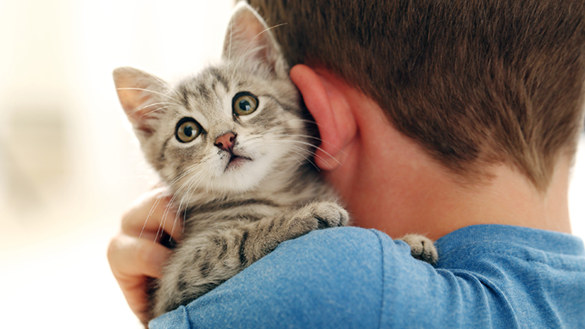Dealing With Pet Stress And Anxiety
How to keep your pet stress free
Pets can become stressed or anxious for a number of different reasons, but there are lots of ways you can help put them at ease and keep them as comfortable as possible.

Pet stress can be triggered by all sorts of changes and events in everyday life, some of which pass unnoticed by owners. While some changes are unavoidable, there are things you can do to help put your stressed pet at ease and keep them as happy and comfortable as possible.
What causes stress in pets?
Pets can struggle with the big and small changes that affect our daily lives. Whether it’s a change in surroundings or routine, there’s a number of factors that can cause your pet to become anxious or stressed.
Moving house
This one may be obvious, but moving house is one of the most stressful events many pets face. Adjusting to completely new surroundings and the chaos that often comes with a move, along with unfamiliar smells and new neighbourhood pets, can cause distress and anxiety.
Advice: Try to keep the same routine for walks, feeding and toilet breaks, as the consistency will help your pet feel more secure. Also, be sure to keep nocturnal animals such as hamsters in quiet, dark places during the day time so they aren’t disturbed.
Visitors
Having people over or hosting parties may be fun for us, but unfamiliar people and crowded rooms can be very stressful for our pet, particularly if they’re naturally shy or nervous around humans.
Advice: There are plenty of non-prescription, natural solutions that can help soothe the effects of anxiety in our pets. Both Feliway and Adaptil use pheromones that are odourless to people but have a calming effect on your pet and are ideal for stressful situations. Speak to your Medivet vet for the perfect product for your stressed pet.
Seasonal celebrations
The excitement of Christmas, fireworks night, New Years and birthdays can sometimes become too much for pets to handle, particularly when they involve loud noises and sudden bangs. Pets may also like to investigate decorations like tinsel and flashing lights, but accidentally eating them can be harmful.
Advice: You could create a safe haven for your pet away from noise and people. A quiet room or corner filled with water bowls, litter trays and your pet’s favourite toys will help reduce their stress levels and pet anxiety.
New pets
Introducing a new member to your family can be an exciting time, and while many pets relish the opportunity of a new animal to play with, for some it can be a very stressful experience.
Advice: When introducing a new pet into the family, try and arrange for your current pet to meet their new playmate before you bring them home, or try scent-swapping by exchanging bedding to familiarise their smells before they move in. Pet crates are also a safe way of letting pets meet each other.
What are the signs of stress?
Keep an eye out for these signs, which can indicate when your pet is feeling stressed or anxious:
- Trembling or shaking
- Hiding behind furniture
- Soiling
- Loss of appetite
- Pacing and panting
- Excessive licking or grooming
- Biting, growling or snarling
- Repetitive yawning
- Consistent barking or meowing
For more advice on keeping your pet stress free, speak to your local Medivet practice.

Medivet Healthcare Plan
On average our clients save up to £280 each year with the Medivet Healthcare Plan.
Learn more

